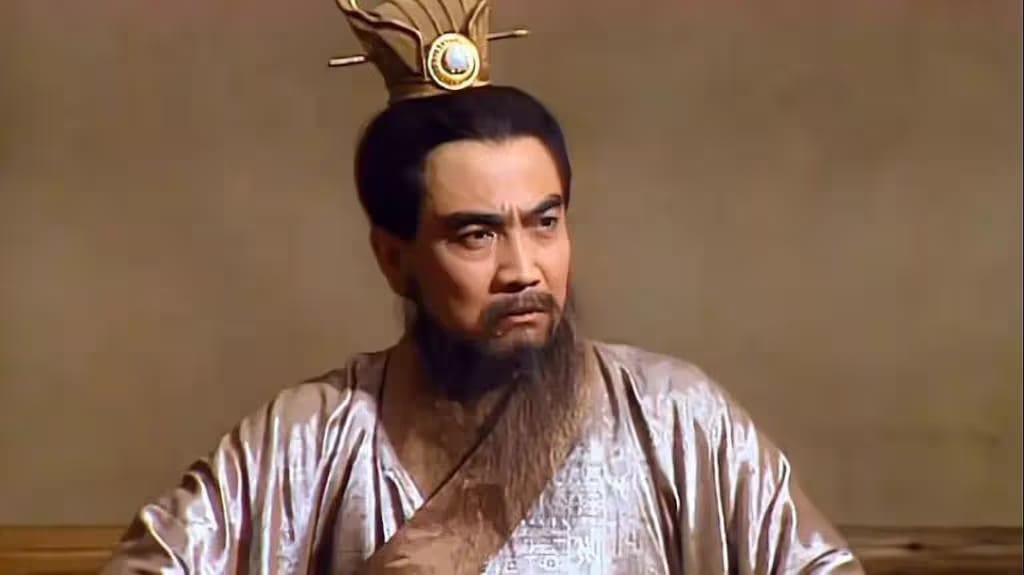
The first thing to talk about in Three Kingdoms and Five Heroes is Cao Cao. This is also one of my favorite characters in the Three Kingdoms era.
Cao Cao had a great influence on the course of Chinese history. In that troubled times, it can be said that he made a great contribution to advancing the times. It has been 1800 years from the Three Kingdoms to the present, and the world has never stopped evaluating Cao Cao's conduct. There are mixed love and hate, mixed praise and criticism, and there is no unified conclusion. This keeps him alive and active on the stage of history.
The first mention of Cao Cao in "The Romance of the Three Kingdoms" was in the first chapter . Luo Guanzhong used about 600 words to write Cao Cao's first appearance - which included Cao Cao's personal brief introduction, some childhood stories and the before and after events of intercepting the Yellow Turban leaders Zhang Liang and Zhang Bao.
Statue of Wei Taizu Cao Cao
Through these events and the records in "Three Kingdoms·Wu Di Ji", it can be seen that Cao Cao was "vigorous and powerful" in his youth, but "flying eagle and running dog, wandering wildly". It can be seen that Xiao Cao was not a fuel-efficient lamp when he was a child. However, the more such a child is, the more it will attract some people's attention. It is the same now. For example, if you are a teacher, among the students you lead, there are only two kinds of students you can remember: those who are particularly excellent in character and learning, and those who are particularly mischievous. Students who are in the middle and tepid will usually forget it after many years. After Cao Cao became an adult, Qiao Xuan (also known as Qiao Xuan), a famous minister of the Eastern Han Dynasty, once pointed out to him:
The world will be chaotic, and the talents of the world will not be able to save it, but those who can make peace, it depends on the king! ——"Three Kingdoms · Emperor Wu"
This is a very advanced evaluation. It can be seen that he has entrusted him with the great responsibility of being able to stabilize the world. In addition, "Yuedan Commentary" was popular at the end of the Eastern Han Dynasty, and you will see simulated scenes in "The Military Division Alliance of Sima Yi, the Great Military Division". Although Xu Shao, who commented on Yuedan, was unwilling to give Cao Cao a comment at first, he still gave this comment after being pestered by him:
You are "a traitor in Qingping, a hero in troubled times". ——"Book of the Later Han Dynasty Xu Shao Biography"
It is said that after Cao Cao heard this, he was very happy, laughed and walked away. Now most of my friends are influenced by "The Romance of the Three Kingdoms", and think that it should be the sentence "A capable minister who governs the world, and a traitor in a troubled world". In fact, this upside-down and rewritten comment has greatly affected the impression of Cao Cao on the posterity. Kuang Qiaoxuan and Xu Shao are not from later generations, and this comment made without observing his life's achievements does not count.
Therefore, if you listen to the evaluation, you should also selectively study the evaluation of its contemporaries. These people have their subordinates and colleagues, and of course they also have opponents from enemy countries. Of course, this includes flattery and despicable words, it depends on how you analyze it. For example, before the Battle of Guandu, Guo Jia, his military adviser, praised Cao Cao in ten aspects and demoted Yuan Shao; counselors Xun Yu, Cheng Yu, Jia Xu, Dong Zhao, including generals, all spoke highly of Cao Cao. . But for example, when you hear these: before the Battle of Chibi, when Zhou Yu was transferred back from Poyang by Sun Quan, he said that Cao Cao "was actually a Han thief under the name of Han Xiang"; Dispossess the world and destroy the people's property"; Chen Lin drafted a call to action that scolded Cao Cao's ancestors for three generations. You may be confused - what kind of person is this? Therefore, unilateral evaluation does not count, and cannot be generalized or taken out of context. Moreover, the remarks of hostile forces often have the meaning of agitating and fanning, and cannot be adopted. However, it also has a very high reference value.
After the Three Kingdoms, entered the Jin Dynasty. The first classic that can be referred to is Chen Shou's "Three Kingdoms", and Chen Shou spoke highly of Cao Cao. He did not compare Wei Daihan to Wang Mang's "usurpation" of Wang Mang's Daihan, but made comments such as "finally able to control the imperial machine and conquer great achievements" and "extraordinary people, superheroes". But there are also descriptions of its suspicious, bloodthirsty, repetitive and other characteristics, in short, "the merits outweigh the demerits". In addition, Wang Shen's "Wei Shu" and Sima Biao's "Continued Han Shu" also have a high evaluation of it.
You must know that historians and works in the Wei and Jin Dynasties respected Cao Wei as orthodox, including the later "Zi Zhi Tong Jian", which called Cao Cao the "Tai Zu".
However, Sun Sheng's "Miscellaneous Languages" and Wu Ren's "Cao Man Biography" mentioned above recorded many aspects of Cao Cao's tyranny, treachery, and usurping. These remarks also influenced the views of later generations on Cao Cao, as well as Luo Guanzhong, the author of "The Romance of the Three Kingdoms".
In addition, Eastern Jin historian Xi Zouchi took the Shu Han as the official history, and he believed that Wei's final succession to the Han was "usurping". And "Book of Jin Xi Chiu Chi Biography" even wrote "Emperor Jin Yiyue Wei Jihan", which means to directly erase Wei, and the Jin Dynasty is behind the Han Dynasty. It can be seen that this is the first one to characterize Cao Wei as a "usurper" historian.
After entering the Southern and Northern Dynasties, Sui and Tang Dynasties, Cao Cao's image was no longer tall, but he was "treacherous" in the world. You can see Liu Yiqing's "Shi Shuo Xin Yu", and even included some things about Cao Cao in "False Stories". People in the Tang Dynasty admired Cao Cao, such as Du Fu and Du Mu, and there was no lack of praise in their poems. In February of the 19th year of Zhenguan, Li Shimin sent troops to Koryo, passed by Cao Cao's tomb in Yecheng, and wrote an "Writing of Worshiping Wei Taizu". There are words of praise such as "majestic posture" in it, as well as the following words:
Look at drowning but not save, look at subversion but not hold on. There is no trace of the king if he is obedient to the country. —— "Quan Tang Wen" Volume 10
It can be seen that Li Shimin also has his own praise and criticism for Cao Cao, and the sentence "no king" defines Cao Cao's nature. Sima Guang of the Northern Song Dynasty also strongly affirmed Cao Cao's achievements when he wrote the book, but there were also words like "I have had no king's heart for a long time". In fact, it is also euphemistically saying that Cao Cao is a traitor who usurped the Han.
In the Northern Song Dynasty, the image of Cao Cao as a traitor had penetrated into the folk. When storytellers in the streets and alleys were talking about the Three Kingdoms, the common people clapped their hands and cheered as soon as they heard that Cao Bing was defeated. When he heard the defeat of the Shu soldiers, he couldn't help sighing and even weeping bitterly. This is a noteworthy thing, which shows that Cao Cao's bad side has been magnified and deeply rooted in the hearts of the people.
In the Southern Song Dynasty, the people of the Southern Song Dynasty hated Cao Cao. For example, Zhu Xi, a great Confucian, and Lu You, a patriotic poet, all regard Cao Cao as an "enemy". The founding emperor of the Southern Song Dynasty, Zhao Gou, fled to the south, established his capital in Hangzhou, and turned to the south, just like the Shu Kingdom was in the land of abundance at that time. The Cao Wei regime hated it to the bone. Lu You even expressed his inner emotions with "the fate of the state will prosper the Han Dynasty, and the heart of heaven will fight against the thieves" . Hong Mai also criticized Cao Cao by saying that "Cao Cao is a ghost of the Han Dynasty, and a gentleman does not behave" .
It was precisely in such a period (Song and Yuan Dynasties) that the storybooks of the Three Kingdoms had already appeared, and some scripts and repertoires were derived later. Luo Guanzhong's "Romance of the Three Kingdoms" was completed under such a general environment and such an overall cognition and evaluation of Cao Cao, and its "treacherous" character image has been qualitative. Therefore, the image of Cao Cao in "The Romance of the Three Kingdoms" represented a mainstream of society's cognition at that time, and it was an ideological orientation. Cao Cao in "The Romance of the Three Kingdoms" either appears as a "usurping" image, or treats people and things as a "cunning" image. Therefore, this is an art-processed novel that looks at people with colored glasses. This is not the image of Cao Cao himself. But from the perspective of literature and art, there is nothing wrong with such a description, but it cannot be read as a "history book".
During the Ming and Qing Dynasties, Cao Cao's image was still severely dual-faced. When the Qianlong Dynasty compiled the "Siku Quanshu", Hongli strictly forbade the compilation of "The Account and Temple Records of Emperor Wu of Weizhou in Haozhou" written by the ancient writer Mu Xiu of the Northern Song Dynasty, and said that it "rewards usurpers and assists rebellion" and "how can it still be sidelined?" Bamboo slips will tarnish history." The word "usurpation" shows Cao Cao's image in Emperor Qianlong's heart. Therefore, after the Qianlong Dynasty, few people praised Cao Cao's good side.
In the 1920s, Mr. Hu Shi once said that "The Romance of the Three Kingdoms" "the fallacy of the book lies in overthrowing the monarchs and ministers of Shu Han and overrepressing Cao Mengde"; Zhang Taiyan also said that Cao Cao was "although strange but close to righteousness"; At least he is a hero. Although I am not in Cao Cao’s party, I always admire him.” In the 1950s, Guo Moruo published “On Cai Wenji’s <Hu Jia’s Eighteen Pads>” and “Replacing "Cao Cao Overturns the Case" is also trying to reshape Cao Cao's image. He thinks Cao Cao is a great figure, at least he can't be judged as a whole. This discussion has already started, and many scholars have participated in it. Although there was no unified opinion in the end, the objective evaluation of Cao Cao's life's merits and demerits was still put on the table, rather than the appalling image of "beating to death with a stick" in previous dynasties. In addition, during the Cultural Revolution, Cao Cao became a "big legalist, an atheist, and a fighter who completely opposed Confucianism" because of the "criticizing the law and criticizing Confucianism" campaign. With the failure of the Cultural Revolution, these auras faded, Cao Cao was still Cao Cao, and nothing changed. To this day, the evaluation of Cao Cao's character image is still under discussion, and it is difficult to determine it qualitatively.





Comments
There are no comments for this story
Be the first to respond and start the conversation.